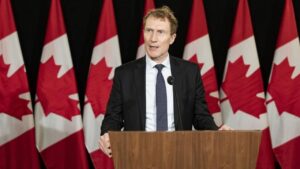Government-Central Bank fight: Clash of Canada’s Immigration Policy on Non-Permanent Residents
Among the most difficult divergences within Canada’s immigration policy, which is inextricably linked to the country’s multifaceted growth, are the government objectives and Central Bank forecasts. In detail, Immigration, Refugees, and Citizenship Canada has announced a plan for reducing the intake of non-permanent residents, while the Bank of Canada did the opposite by predicting the trend to exacerbate the national discourse on immigration and population growth further. Government Target: Reduction in NPRs Percentage On March 21, the IRCC announced a plan to reduce the non-permanent residents in Canada from 6.2 percent of the population to 5 percent over three years. Proposed changes to the immigration policy came as a result of rising pressures put by the growing inflow of temporary residents, particularly international students, temporary workers, and refugees, on housing markets and public infrastructure. Government Target: Reduction in NPRs Percentage Reduction Goal: Lower the current NPR share of 6.2% down to 5% by 2026.Cap on Study Permits: The goal is a 35% reduction in the number of study permits issued in 2024 relative to 2023.Motivation: High costs of shelter and pressures on infrastructure.Central Bank’s Forecast: Higher NPR NumbersHowever, in the new Monetary Policy Report from the Bank of Canada, minorities appear to indicate otherwise: NPR numbers will continue to rise. Early this April, NPRs accounted for 6.8 percent of the population—higher than the number previously reported. What is more, the projections by the BoC indicate that the yearly growth rate in population will only inch down incrementally over the coming couple of years despite the government plans. Central Bank Takeaways: Population Growth: Population growth estimates have been revised upwards; indeed, the NPR assumes more rapid population growth than projected.Uncertainty: The trajectory that the NPR inflows would take in the future remains elusive, rendering the 5% target complicated.Study Permits: Study permits were up at the start of 2024, contrary to the expectation of the government cap. Number Discrepancy Study permit approvals between the first five months of 2024 increased to 216,620 from 200,505 during the same period in 2023. Much as the IRCC has put in the best efforts, the cap on the number of study permits in real terms has far exceeded. Students from India, among these, were leading demographics to contribute a big portion to study permits issued. Study Permit Statistics: 2023: 682,430 study permits issued, of which 278,335 were for Indian students.2024 (5 months): 216,620 permits issued, of which 91,510 were awarded to Indian students. Conclusion: This has been a critical policy-making and economic forecasting issue: the conflict between the Canadian government’s reduction targets for immigration and the forecast of the Bank of Canada. While the government intends to scale down temporary immigration, presumably in an effort to ease pressures on infrastructure and housing, it is forecast by the Central Bank that NPR numbers can continue to rise, thus jeopardising the possibility of targets being achieved by the government.


